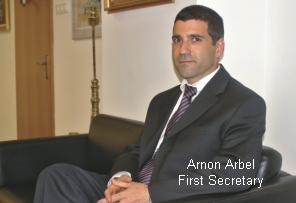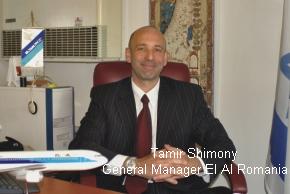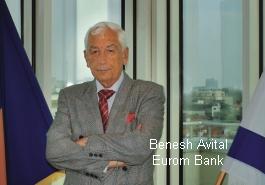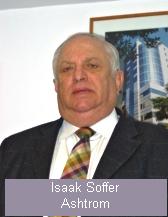Opening the market
Israel has become an almost silent partner in Romania's recent business development
 From a small country with strong experience in security, knowledge of border controls, as well as intensive farming, Israel should be in a position to offer Romania assistance at a crucial time when the agricultural sector is faltering and the nation will soon host the longest border in the EU.
Direct bilateral trade between Romania and Israel is 300 million USD, which does not include military trade. During 2004 this increased by more than 25 per cent compared to the previous year and the trend will continue this year, says Arnon Arbel, first secretary of economic and commercial affairs at the Israeli Embassy to Bucharest.
But most Israeli investments to Romania are indirect, so unofficial figures from the economic office reveal more than one billion USD.
Military cooperation between the two countries is also strong, says Arbel, and there are numerous delegations between the two countries. “In the age of global threats, Romania needs to understand that, by becoming another EU country, it will face the same threats,” says Arbel. “Also, Romania will become the eastern boarder of the EU and Israel can help with its experience in border control and other defence matters.”
Arbel says that direct investment from Israel will increase steeply this year, as two significant Israeli firms, in the energy sector and dairy industry, are making large expenditure plans for Romania.
“Romania is facing a very big obstacle at the moment,” adds the secretary. “Before joining the EU, the country agreed to produce a certain quota of milk to a required standard. Currently, Romanian milk production and quality is very low.”
Many Israeli construction and infrastructure companies are active in Romania. The high-tech communication field is also covered by Israeli investors, not only in providing services and technologies, but also in using the excellent human resources offered by Romania, especially for the second part of R&D.
“Research is usually done in Israel,” says Arbel. “Then some companies open development centres in Romania using highly skilled local staff. Even for these high-tech companies, the name of the game is globalisation, so when they are looking for a place to invest they are considering many factors, such as the quality of the people who work for them, the costs and geographical proximity.”
The secretary believes that Romania should face the problem of environmental protection before it is too late.
“Joining the EU will require companies to invest resources in sewage, canalisation, pollution and waste disposals, after European and American standards, which will take a long time,” says Arbel.
In terms of infrastructure, three years ago two Israeli companies, Tahal and Solel Boneh, active in civil engineering, construction and infrastructure, won an international bid to provide uncontaminated water to villages.
Recently, Arbel has seen more textile companies in Romania and development in the finance sector, such as Eurom Bank and insurers Omniasig. “I would like to see more financial service companies active here,” he adds.
In Israel, the number of Romanians working in the country has, after an initial rush in the 1990s, decreased considerably, partly due to the policy of offering jobs to the Palestinians.
“Every Romanian coming to work is Israel is taking the place of a Palestinian,” says Arbel.
One problem of establishing a common business culture in Romania is that many firms do not like to or want to mention that they are Israeli, preferring to see the origin of their investment as 'global', 'international' or 'American'.
“This is due to unfortunate past experiences,” says Arbel. “Usually there is no good in coming out strongly and waving the Israeli flag. Nevertheless, there are exceptions in the agriculture and technology sectors, where it is a very good idea to wave our flag, because we are well known as expert in these fields.”
Reform in the investment sector is also essential, says Arbel, in order to make the foreign firm's passage to market far smoother.
“I would like to see a national program dedicated entirely to foreign investors, something like a one-stop-shop where a foreign investor can receive everything he needs at once,” says Arbel, who recommends some kind of single package or folder that details exactly the legislation and paperwork needed to bring cash into the country's business environment.
From a small country with strong experience in security, knowledge of border controls, as well as intensive farming, Israel should be in a position to offer Romania assistance at a crucial time when the agricultural sector is faltering and the nation will soon host the longest border in the EU.
Direct bilateral trade between Romania and Israel is 300 million USD, which does not include military trade. During 2004 this increased by more than 25 per cent compared to the previous year and the trend will continue this year, says Arnon Arbel, first secretary of economic and commercial affairs at the Israeli Embassy to Bucharest.
But most Israeli investments to Romania are indirect, so unofficial figures from the economic office reveal more than one billion USD.
Military cooperation between the two countries is also strong, says Arbel, and there are numerous delegations between the two countries. “In the age of global threats, Romania needs to understand that, by becoming another EU country, it will face the same threats,” says Arbel. “Also, Romania will become the eastern boarder of the EU and Israel can help with its experience in border control and other defence matters.”
Arbel says that direct investment from Israel will increase steeply this year, as two significant Israeli firms, in the energy sector and dairy industry, are making large expenditure plans for Romania.
“Romania is facing a very big obstacle at the moment,” adds the secretary. “Before joining the EU, the country agreed to produce a certain quota of milk to a required standard. Currently, Romanian milk production and quality is very low.”
Many Israeli construction and infrastructure companies are active in Romania. The high-tech communication field is also covered by Israeli investors, not only in providing services and technologies, but also in using the excellent human resources offered by Romania, especially for the second part of R&D.
“Research is usually done in Israel,” says Arbel. “Then some companies open development centres in Romania using highly skilled local staff. Even for these high-tech companies, the name of the game is globalisation, so when they are looking for a place to invest they are considering many factors, such as the quality of the people who work for them, the costs and geographical proximity.”
The secretary believes that Romania should face the problem of environmental protection before it is too late.
“Joining the EU will require companies to invest resources in sewage, canalisation, pollution and waste disposals, after European and American standards, which will take a long time,” says Arbel.
In terms of infrastructure, three years ago two Israeli companies, Tahal and Solel Boneh, active in civil engineering, construction and infrastructure, won an international bid to provide uncontaminated water to villages.
Recently, Arbel has seen more textile companies in Romania and development in the finance sector, such as Eurom Bank and insurers Omniasig. “I would like to see more financial service companies active here,” he adds.
In Israel, the number of Romanians working in the country has, after an initial rush in the 1990s, decreased considerably, partly due to the policy of offering jobs to the Palestinians.
“Every Romanian coming to work is Israel is taking the place of a Palestinian,” says Arbel.
One problem of establishing a common business culture in Romania is that many firms do not like to or want to mention that they are Israeli, preferring to see the origin of their investment as 'global', 'international' or 'American'.
“This is due to unfortunate past experiences,” says Arbel. “Usually there is no good in coming out strongly and waving the Israeli flag. Nevertheless, there are exceptions in the agriculture and technology sectors, where it is a very good idea to wave our flag, because we are well known as expert in these fields.”
Reform in the investment sector is also essential, says Arbel, in order to make the foreign firm's passage to market far smoother.
“I would like to see a national program dedicated entirely to foreign investors, something like a one-stop-shop where a foreign investor can receive everything he needs at once,” says Arbel, who recommends some kind of single package or folder that details exactly the legislation and paperwork needed to bring cash into the country's business environment.
FLIGHT TO RETURN
 Newly privatised national Israeli airline El Al is aiming to increase its frequency of flights and wants to help Israel become an alternative to high-end tourists over-familiar with middle eastern destinations.
In January 2005 El Al completed its privatisation process and Knafaim Arkia Holdings, which operates aviation, transportation and tourism companies, became the controlling shareholder by increasing its holding to 40 per cent.
In the winter there are four flights per week between Bucharest and Tel Aviv and, for the summer, this doubles.
“Our customers are mostly Israeli businessmen, but we also have Romanians that are leaving to Tel Aviv and pilgrims to Jerusalem,” says Tamir Shimony, general manager for Romania El-Al. He plans to increase the number of flights and wants to promote Israel as a destination for holidaymakers looking for the sun in the winter months, now that the borders have more security. “We have many beautiful places and a lot of sun in the winter, so our districts can compete with Dubai and Egypt. One advantage is the good prices because we deal in USD, not Euro.”
Shimony says Romania has potential for Israeli businesspeople as many of them know the language. “Most of them have Romanian family and, after they succeed with their business in Israel, they invest here in Romania,” he adds.
Newly privatised national Israeli airline El Al is aiming to increase its frequency of flights and wants to help Israel become an alternative to high-end tourists over-familiar with middle eastern destinations.
In January 2005 El Al completed its privatisation process and Knafaim Arkia Holdings, which operates aviation, transportation and tourism companies, became the controlling shareholder by increasing its holding to 40 per cent.
In the winter there are four flights per week between Bucharest and Tel Aviv and, for the summer, this doubles.
“Our customers are mostly Israeli businessmen, but we also have Romanians that are leaving to Tel Aviv and pilgrims to Jerusalem,” says Tamir Shimony, general manager for Romania El-Al. He plans to increase the number of flights and wants to promote Israel as a destination for holidaymakers looking for the sun in the winter months, now that the borders have more security. “We have many beautiful places and a lot of sun in the winter, so our districts can compete with Dubai and Egypt. One advantage is the good prices because we deal in USD, not Euro.”
Shimony says Romania has potential for Israeli businesspeople as many of them know the language. “Most of them have Romanian family and, after they succeed with their business in Israel, they invest here in Romania,” he adds.
FINANCING FUTURES
 Israel has a growing presence on the local banking market with domestic-based finance firm Eurom Bank. Founded with a 22.5 million USD investment from Israeli investors, the bank now has 34 branches in the country and a target to open a further five this year.
“For 2005 we will focus on the retail market and on entering the capital market,” says Benesh Avital, chairman of the board of administration. This year the firm has also launched its Internet banking option.
“Due to the fact that Eurom Bank's shareholders and part of the management are Israeli, we hope to bring many of our nation's investors to Romania. The most tempting investment sectors for them are real-estate, agriculture and food,” says Avital, adding that the firm has signed a deal with Mastercard to offer debit and credit cards.
However the business environment is yet to offer complete stability.
“The law in Romania is quite problematic, litigations take too much time and some of the laws turn the country into a haven for con artists,” says the chairman. “But some of the fiscal problems have been resolved, while the fight against corruption and bureaucracy is going in the right direction.”
Israel has a growing presence on the local banking market with domestic-based finance firm Eurom Bank. Founded with a 22.5 million USD investment from Israeli investors, the bank now has 34 branches in the country and a target to open a further five this year.
“For 2005 we will focus on the retail market and on entering the capital market,” says Benesh Avital, chairman of the board of administration. This year the firm has also launched its Internet banking option.
“Due to the fact that Eurom Bank's shareholders and part of the management are Israeli, we hope to bring many of our nation's investors to Romania. The most tempting investment sectors for them are real-estate, agriculture and food,” says Avital, adding that the firm has signed a deal with Mastercard to offer debit and credit cards.
However the business environment is yet to offer complete stability.
“The law in Romania is quite problematic, litigations take too much time and some of the laws turn the country into a haven for con artists,” says the chairman. “But some of the fiscal problems have been resolved, while the fight against corruption and bureaucracy is going in the right direction.”
 Following an initial investment worth 5.7 million Euro, construction firm Ashtrom has been active in projects such as building villas in Floreasca, Bucharest and 50 gas stations for Lukoil.
New projects include modernising the Excelsior theatre in Bucharest and the future motorway section between Predeal and Brasov, which is worth 225 million Euro.
The lack of mortgage banks in Romania has been a disadvantage for the Romanian construction market, says Ashtrom General Director Isaak Soffer, as well as Romanian individuals' low purchasing power.
“The Romanian construction market is difficult, unpredictable and risky,” says Soffer. Nevertheless, he finds that, following the fertile period of development that Bucharest has enjoyed, Constanta and Brasov will be the next two districts that will be attractive for the construction market.
“We cannot predict the effects of Romania's joining the EU,” adds the general director, “but we can predict an increase in the price of the working force and, consequently, an increase in building costs.”
Following an initial investment worth 5.7 million Euro, construction firm Ashtrom has been active in projects such as building villas in Floreasca, Bucharest and 50 gas stations for Lukoil.
New projects include modernising the Excelsior theatre in Bucharest and the future motorway section between Predeal and Brasov, which is worth 225 million Euro.
The lack of mortgage banks in Romania has been a disadvantage for the Romanian construction market, says Ashtrom General Director Isaak Soffer, as well as Romanian individuals' low purchasing power.
“The Romanian construction market is difficult, unpredictable and risky,” says Soffer. Nevertheless, he finds that, following the fertile period of development that Bucharest has enjoyed, Constanta and Brasov will be the next two districts that will be attractive for the construction market.
“We cannot predict the effects of Romania's joining the EU,” adds the general director, “but we can predict an increase in the price of the working force and, consequently, an increase in building costs.”
CORPORATE HOSPITALITY
BST Construction and Development has brought the Dutch Golden Tulip franchise to Bucharest, choosing to come here because of the international experience of this chain.
The first building is an 82 room building on Calea Victoriei and the investors intend to extend their projects to construct more hotels and apartments, including a high class apartment building with 120 units in the centre of Bucharest.
“The hotel was planned for business people mainly, but it can also serve leisure travellers,” says General Manager Nati Krakover.
The occupancy of the hotel is currently over 80 per cent and it will soon provide three 30 seat-conference rooms.
“There still aren't enough hotel rooms in Bucharest,” says Krakover, “even though the investors and business people traffic is intense in the city.”
Krakover says the prices of real estate are “fair” in the capital, but one of the disadvantages of the hotel market is the low availability of professionals in the hotel industry. Furthermore, he says there are difficulties in opening a hotel in Romania because of the small variety of local products for the hotel industry.
“Hotel equipment suppliers tend not to have items on stock, which is sometimes not convenient for the hotel owner,” Krakover adds.
As far as Romania's accession to the EU concerned this will not have a major affect on the industry, says the general manager, “since the prices are already in Euro.”
TAKING CARE OF BUSINESS
In private medical care Israeli businessman Zahal Levy has now opened three medical centres in Romania, MediHelp, SOS Medical Group and, since December last year, EuroMedic, a cooperation between Levy and Dutch investors.
MediHelp International was established in 1999 to offer comprehensive health care solutions exclusively for expatriates living in eastern Europe, provides emergency medical services 24 hours per day and outpatient care for upper-class Romanians and local companies. SOS Medical Group offers emergency services in an investment, including its building, worth two million USD.
The main aim this year, Levy says, is to bring new technology for sufferers of cardiac ailments.